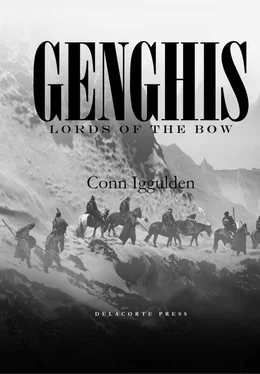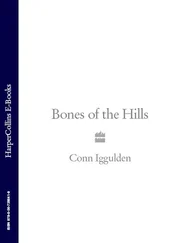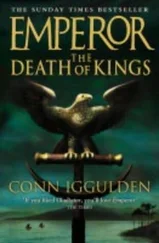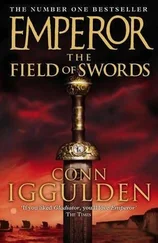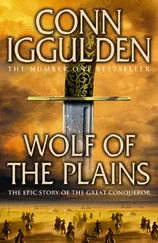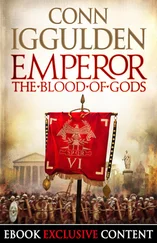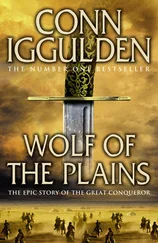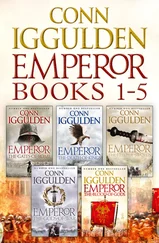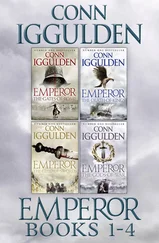Conn Iggulden - Lords of the Bow
Здесь есть возможность читать онлайн «Conn Iggulden - Lords of the Bow» — ознакомительный отрывок электронной книги совершенно бесплатно, а после прочтения отрывка купить полную версию. В некоторых случаях можно слушать аудио, скачать через торрент в формате fb2 и присутствует краткое содержание. Жанр: Исторические приключения, на английском языке. Описание произведения, (предисловие) а так же отзывы посетителей доступны на портале библиотеки ЛибКат.
- Название:Lords of the Bow
- Автор:
- Жанр:
- Год:неизвестен
- ISBN:нет данных
- Рейтинг книги:5 / 5. Голосов: 1
-
Избранное:Добавить в избранное
- Отзывы:
-
Ваша оценка:
- 100
- 1
- 2
- 3
- 4
- 5
Lords of the Bow: краткое содержание, описание и аннотация
Предлагаем к чтению аннотацию, описание, краткое содержание или предисловие (зависит от того, что написал сам автор книги «Lords of the Bow»). Если вы не нашли необходимую информацию о книге — напишите в комментариях, мы постараемся отыскать её.
Lords of the Bow — читать онлайн ознакомительный отрывок
Ниже представлен текст книги, разбитый по страницам. Система сохранения места последней прочитанной страницы, позволяет с удобством читать онлайн бесплатно книгу «Lords of the Bow», без необходимости каждый раз заново искать на чём Вы остановились. Поставьте закладку, и сможете в любой момент перейти на страницу, на которой закончили чтение.
Интервал:
Закладка:
It took four years and the inhabitants of Yenking were reduced to eating their own dead by the time they opened the gates and surrendered in 1215. Genghis accepted the surrender along with tribute of unimaginable value. He then traveled back to the grasslands of his youth, as he did throughout his life. With the siege ended, the emperor fled south. Though he did not turn back himself, Genghis sent an army to the city to take vengeance. Parts of Yenking burned for a month.
Despite his hatred of the Chin, Genghis would not be the one who would see them occupied and subdued at last. That would fall to his sons and grandson Kubla. At the peak of his success, he left China and went west. It is true that the Islamic rulers refused to recognize his authority, but Genghis was too much of a visionary to react without thought. It is an odd fact, usually glossed over in the histories, that he left China when it was ready to fall at his feet. Perhaps it is simply because he was distracted from his hatred by the challenge of the Shah of Khwarazm, Ala-ud-dun-Mohammed. Genghis was not a man to let any challenge go unanswered. In fact, he seemed to revel in them.
He understood the idea of nations and laws, slowly developing his own code, called the Yasa.
"If the great, the military leaders and the leaders of the many descendants of the ruler who will be born in the future, should not adhere strictly to the Yasa, then the power of the state will be shattered and come to an end. No matter how they seek Genghis Khan, they will not find him," he declared.
In this, we see the visionary who could dream nations out of scattered tribes and understand what it entailed to rule across such a vast land.
The system of white tent, red tent, black tent, was used by Genghis as I have described. It was propaganda of a sort, designed to have cities fall quickly from fear. With grazing always an issue for the Mongol herds, prolonged sieges were to be avoided if possible. It suited neither their temperaments nor Genghis's style of warfare, where speed and mobility were central factors. In a similar way, driving enemies toward a city to strain their resources is ruthless common sense. In some ways, Genghis was the ultimate pragmatist, but one feature of Mongol warfare is worth mentioning: revenge. The line "We have lost many good men" was often used to justify an all-out attack after a setback.
He was also willing to try new techniques and weapons, such as the long lance. The bow would always be the weapon of choice for Mongol cavalry, but they used the lance in exactly the same way as medieval knights, as an immensely successful heavy charge weapon against infantry and other horsemen.
Deception is another key to understanding many of the Mongol victories. Genghis and the men who served under him regarded a straight fight almost as discreditable. Victories won by cunning brought far more honor, and they always looked for a way to fool the enemy they faced, whether it was a false withdrawal, hidden reserves, or even straw dummies on spare horses to give the illusion of reserves they didn't actually have. It may interest some to consider that Baden-Powell took exactly the same approach in his defense of Mafeking seven centuries later, with dummy minefields, sending the men to lay invisible barbed wire and all manner of tricks and ruses. Some things don't change.
The incident where Jelme sucked blood from Genghis's neck is an interesting one. No mention of poison survives, but how else can the action be explained? It is not necessary to suck clotted blood from a neck wound. It does not aid healing, and in fact, the act could burst artery walls already weak from the cut. The historical incident took place earlier than I have it here, but it was so extraordinary that I could not leave it out. It is the sort of incident that tends to be rewritten in history, if perhaps a partially successful assassination attempt was seen as dishonorable.
One event from the histories that I did not use was when a banished and starving tribesman took hold of Genghis's youngest son, Tolui, and drew a knife. We cannot know what he intended, as he was killed quickly by Jelme and others.
Such events might help to explain why, when the Mongols later came into contact with the original Arab Assassins, they stopped at nothing to destroy them.
Genghis was far from invincible and was wounded many times in his battles. Yet luck was always with him and he survived again and again-perhaps deserving the belief his men had in him, that he was blessed and destined to conquer.
A note on distances traveled: One of the chief advantages of the Mongol army was that it could turn up just about anywhere in a surprise attack. There are well-attested records of covering 600 miles in nine days, at 70 miles per day, or more extreme rides of 140 miles in a day with the rider still able to continue. The greatest rides involved changes of ponies, but Marco Polo records Mongol messengers covering 250 miles between sunrise and dark. In winter, the incredibly hardy ponies are turned loose. They eat enough snow to satisfy their thirst and are adept at digging through it to find sustenance beneath. When the Franciscan monk John de Plano Carpini crossed the plains to visit Kubla Khan, then at Karakorum, the Mongols advised him to change his horses for Mongol ponies or see them starve to death. They had no such worry for the ponies. Western horses have been bred for brute strength in breeds like the Suffolk Punch horse, or for racing speed. They have never been bred for endurance.
The incident of falling petals is true. Up to sixty thousand young girls threw themselves from the walls of Yenking rather than see it fall to the invader.
Интервал:
Закладка:
Похожие книги на «Lords of the Bow»
Представляем Вашему вниманию похожие книги на «Lords of the Bow» списком для выбора. Мы отобрали схожую по названию и смыслу литературу в надежде предоставить читателям больше вариантов отыскать новые, интересные, ещё непрочитанные произведения.
Обсуждение, отзывы о книге «Lords of the Bow» и просто собственные мнения читателей. Оставьте ваши комментарии, напишите, что Вы думаете о произведении, его смысле или главных героях. Укажите что конкретно понравилось, а что нет, и почему Вы так считаете.
